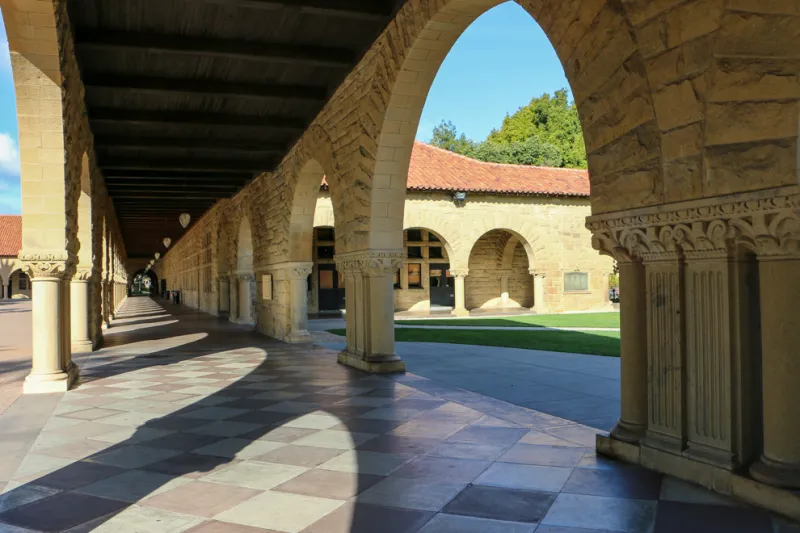Growing up, one of my mom’s biggest lessons was the serenity prayer:
God, grant me the serenity to accept the things I cannot change,
Courage to change the things I can,
And wisdom to know the difference.
I am from the 3rd Ward in Houston, TX, that one place Beyonce talks about in Homecoming. But one of the last times when I went back, I truly got a proper homecoming surprise. Upon my arrival to Houston from a trip to Europe in 2019, I ran into my Congresswoman Rep. Sheila Jackson Lee, one of the first Democrats to support Trump’s impeachment from the jump, stating, “We proceed with facts.” I told her that I was proud that she was holding Trump accountable as we posed for a photo.
When we ran into each other in Ross, she had recognized me and asked for my major and how Stanford was going, and she then offered me an internship if I wanted one. This encounter reflects my belief that my actions speak louder than words, and I draw on these memories now to make clear the experiences that inform my politics today.
In high school, I worked alongside Republicans and Democrats at my school to throw one of the largest youth political events in Houston and was a part of the most active Young Democrats Club in the state of Texas. I also frequently made appearances at the Junior Statesmen of America (JSA), a national bipartisan political engagement organization. See, for years, I’ve been working with various youth empowerment organizations in Houston, namely the World Youth Foundation. For three years, I went with youth in my district (twice as a student and once as a guide) to the Congressional Black Caucus Annual Legislative Conference where I’ve met Kamala Harris, Cory Booker and Maxine Waters in addition to seeing Hillary Clinton and Barack Obama. In all of these political experiences, I learned the serenity model of politics. I wasn’t trying to change the minds of people I’ve disagreed with — rather, I was trying to model better political behavior so we could all be nicer. Changing minds comes naturally thereafter.
My work in high school demonstrated an early commitment to working with people from all backgrounds in order to get things done. Although SCR tried to use this against me when I first ran for Senate, I rebuked them in an op-ed called “Ain’t No Omarosa ‘round Here.” Political grace is what I wrote about in my Stanford essay, which was published on Forbes after my admissions video went viral on Twitter, leading to articles published in the New York Times and Washington Post. The morning after my Stanford reaction was first played on KHOU 11 in Houston, I went to a donut shop with my mom who told the cashier that I’d gotten into Stanford; his response: “What position do you play?” This was what I would come to learn at Stanford was a microaggression. Long before I arrived at this school, I had to learn to find serenity in the face of external adversity, both within and outside my political work.
Weeks later, a video surfaced with over 3 million views of three women calling me, a 17-year-old kid, “obnoxious” for applying to a lot of schools. I tried to laugh it off, but many people who did not know me at all were judging me, so it hurt. It reminded me of Rowan Pope telling Olivia, “You have to be twice as good as them to get half of what they have.” Although it helped to see outrage on social media like on the Breakfast Club who gave the newscasters “Donkey of The Day,” I saw that as superficial accountability. I called the station to interview one newscaster, asking her to explain herself and apologize; the other two apologized separately.
The one newscaster refused to apologize, with the Huffington Post praising my decision not to allow the interview with the reporter to air after her refusal to apologize. Youtuber Casey Neistat offered his public support, saying “the world needs more people like you,” and I decided to keep my head high in hopes that my positive behavior might inspire positivity and love from others — even if I couldn’t change how some thought about me. The practice of serenity and political grace informed how I chose to approach FoHo #135, refusing to give them screenshots of my private conversations to fuel the flame of rumors about my personal relationship after copies of my personal messages were leaked to the FoHo.
In high school, I started my high school’s first diversity club and received the 2017 Princeton Prize in Race Relations because, after the shooting of Michael Brown, students began calling me Ferguson. After coming to Stanford, I’d hoped to escape this sort of name-calling, yet I’ve been described with various coded language such as “scandalous,” “politically advantageous” and Machiavellian. I’ve developed anxiety from being Zoombombed, threatened with lawsuits, bullied and publicly humiliated. I’ve been compared to Godzilla whilst fighting to hold people associated with powerful groups like SCR, Turning Point USA and Save Our Sons accountable.
It feels impossible to hold someone accountable without there being an assumed ulterior motive. Everyone is entitled to their opinions on our work, personal life and every literal phrase we say. This, at times, has made me fearful to walk around campus, but my gut knows me and what I stand for. Unfortunately, this comes with the territory of being Black, outspoken and unprotected at a predominately white institution (PWI). But I find my strength in serenity, making space for grace and accountability because there is too much more work to be done.
The Daily is committed to publishing a diversity of op-eds and letters to the editor. We’d love to hear your thoughts. Email letters to the editor to eic ‘at’ stanforddaily.com and op-ed submissions to opinions ‘at’ stanforddaily.com.
